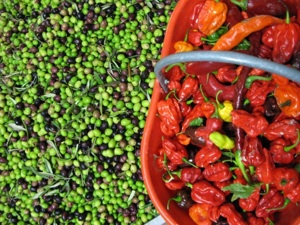Editor’s Note: German chile expert Harald Zoschke comments on the Designation of Origin for the Habanero in Mexico.
 First, I’m not a legal expert nor a lawyer, so this is just personal opinion without any legal relevance. It is strange that a generic variety name like “Habanero” was granted protection without a regional qualifier. Different story with the protected names over here. For example, there’s a protected Piquillo pepper, but that one is named “Piquillo de Lodosa”, after the town in the Navarra community where it is grown and protected for origin. But plain “Piquillo” can be grown anywhere and sold under this name. Another one is “Peperone di Senise,” a protected pepper from the area around Senise in the southern Italian region of Basilicata. Even “Piment d’Espelette” has its origin in the name, and I heard of Calabrian efforts to protect “Peperoncini di Calabria.” These three cases mean nothing but “Peppers from [region name here].” And “Champagne” or “Roquefort” also indicate their origin in the name, which as far as I understand is a vital qualifier to receive protection. You can name any bratwurst just that, but
First, I’m not a legal expert nor a lawyer, so this is just personal opinion without any legal relevance. It is strange that a generic variety name like “Habanero” was granted protection without a regional qualifier. Different story with the protected names over here. For example, there’s a protected Piquillo pepper, but that one is named “Piquillo de Lodosa”, after the town in the Navarra community where it is grown and protected for origin. But plain “Piquillo” can be grown anywhere and sold under this name. Another one is “Peperone di Senise,” a protected pepper from the area around Senise in the southern Italian region of Basilicata. Even “Piment d’Espelette” has its origin in the name, and I heard of Calabrian efforts to protect “Peperoncini di Calabria.” These three cases mean nothing but “Peppers from [region name here].” And “Champagne” or “Roquefort” also indicate their origin in the name, which as far as I understand is a vital qualifier to receive protection. You can name any bratwurst just that, but
“Nürnberger Bratwurst” has is protected and has to be made in the City of Nuremberg, Bavaria.
How much a plain “Habanero” would have to be respected here, I don’t know. As pointed out, over here, only something like “Yucatán Habanero” would have received legal origin protection. Among other EU countries, Habaneros are grown in Holland for trade within the EU. I’d expect the Dutch growers to oppose. And what about Tropical Red Habanero from the Caribbean and the like? Also, speaking of the origin name, I think I read in one of your books that “Habanero” means “From Havana,” so grant the name rights to Cuba, if at all.







